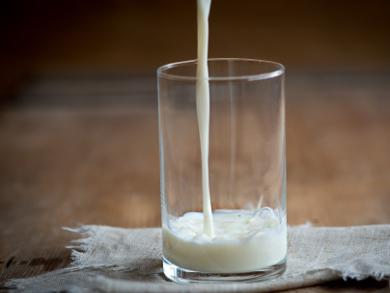Rotavirus infections cause “stomach flus”, which are a leading cause of death in developing countries and a substantial health problem in developed nations. While there are vaccines against the virus, logistical and financial reasons keep them from being widely used in developing nations. Some food products have shown activity against rotavirus. This effect can be caused by antibodies, e.g., in bovine colostrum (milk produced by cows shortly before giving birth), however, the production potential of these products is limited.
Lourdes Sánchez, Universidad de Zaragoza, Spain, and colleagues have investigated the effect of cow’s and sheep’s milk byproducts on rotavirus infections. The team made buttermilk from raw cow’s and sheep’s milk. The procedure was performed both with and without washing the cream using a buffer solution prior to being churned into butter (a process called cream washing). The buttermilk’s effect was tested both with and without prior heat treatment.
The researchers used an immunofluorescence assay to evaluate the products’ effect on rotavirus infectivity. They found that buttermilk from sheep reached neutralization values of 51.3 %, buttermilk from cows 32.2 % at equal protein concentrations. Cream washing led to a significant decrease in activity, as did heat treatment. The antirotaviral effect could be attributed to proteins in the product, e.g., immunoglobulin G (IgG), xanthine dehydrogenase/oxidase (XDH/XO), and proteose peptone component 3 (PP3). Cream washing is thought to partly remove these components, while heat treatment inactivates the proteins. According to the team, the study should provide a base for further investigation of milk byproducts as sources of valuable bioactive compounds with antirotaviral activity.
- Antirotaviral Activity of Bovine and Ovine Dairy Byproducts,
José Antonio Parrón, Daniel Ripollés, María Dolores Pérez, Miguel Calvo, Jan Trige Rasmussen, Lourdes Sánchez,
J. Agric. Food Chem. 2017.
DOI: 10.1021/acs.jafc.7b01059



